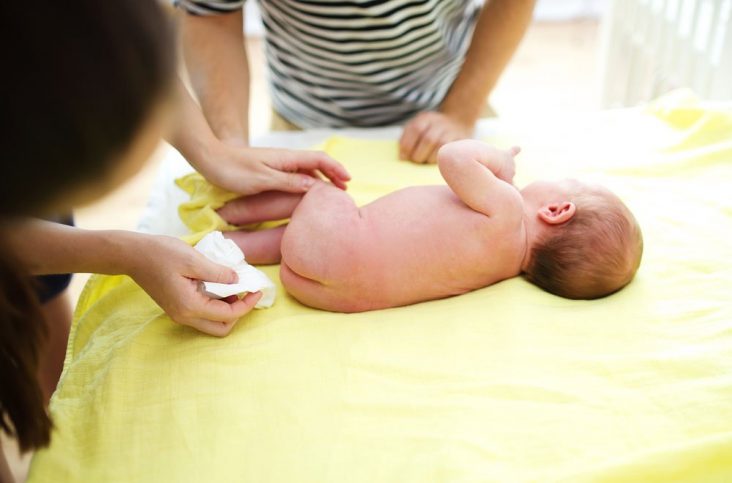Is your child’s bowel movement regular? Is it unusual? Is it loose? Are you firm? Is it yellow, brown, or multicolored? Is it better to be stinky or sweet?
The good news is that poop is a good predictor of your baby’s health, but you’ll find yourself obsessing about what’s in those gross diapers.
It’s also available in a wide range of colors, consistency, and frequency, all of which are considered safe and “natural.” Here you’ll find answers to all of your burning baby poop queries.
The first poop of a baby is meconium.
When you changed your newborn’s diaper for the first time, did you see greenish black poop? That’s meconium, a sticky, tar-like material that built up in your baby’s intestines during her time in your womb.
It’s perfectly natural, despite its eerie appearance. In reality, the fact that the meconium is in her diaper rather than her intestines is a positive sign; it means her bowels are working properly.
Stools with a transitional design
Transitional stools are dark greenish yellow and loose, often “seedy” in texture (especially among breastfed infants), and may sometimes contain mucus after the first 24 hours, when all the meconium has been passed. There might also be blood traces in them, owing to your baby swallowing some of your blood during birth (just to be sure, save any diaper containing blood to show to a nurse or doctor).
The color and quality of your baby’s poop can be determined by the type of food she’s consuming after three or four days of transitional stools, though this can vary from day to day and from bowel movement to bowel movement, leaving even seasoned parents scratching their heads.
Is my child’s feces normal?
If you’re breastfeeding or formula-feeding, your baby’s poop should be regular. If your baby is breastfed, her bowel movements may be mustard-colored and consistency, sometimes loose and even watery, and sometimes seedy, mushy, or curdy.
If she’s been formula-fed, her stool will be soft but more developed than that of a breastfed infant, and it will range in color from pale yellow to yellowish brown, medium brown, or brownish gray.
What is the optimal poop frequency for a newborn?
Breastfed infants, on average, have one poopy diaper for every day of their lives. In other words, she would poop once on day one of her life and twice on day two.
Fortunately, this trend typically doesn’t last more than five days. The average breastfed infant will have about five dirty diapers a day after day five, but anything from one dirty diaper every few days to many every day is typical.
Breastfed babies’ poop habits can begin to shift about 6 weeks of age, and you can find your baby missing a day (or two… or three) between bowel movements.
Or maybe not. During the first year, several babies will poop many times a day, if not more. Others will go several days without changing their diapers.
It’s not important to keep track after 6 weeks as long as the baby is content and growing. It’s perfectly natural for the number to fluctuate from day to day.
Formula-fed babies poop three to four times a day on average, but some can go three or four days without a bowel movement. You don’t need to be worried as long as your baby’s poop is smooth and passes without difficulty. If your child hasn’t pooped in more than five days, see your pediatrician.
How do I know if my baby has pooped?
When your baby poos, don’t be surprised if she grunts, groans, grimaces, or strains. Since their little bottoms aren’t solid or balanced enough for quick removal, that’s common pooping practice for infants, even when passing soft stool.
What do the various colors of baby poop mean?
The color, texture, and even the scent of newborn poop can all shift quickly.
Since the contents of your baby’s diaper may reveal potential health problems, it’s important to pay attention and notify your pediatrician if you see something unusual.
What does it mean if my baby’s stool contains blood?
Blood in your baby’s stool could indicate a sensitivity or allergy to something in your diet if she is breastfed. To find out what’s causing it, your pediatrician may suggest that you try avoiding a possible problem food for two to three weeks, such as dairy, soy, peanuts, wheat, or tree nuts.
Blood in your baby’s stool could mean that she’s allergic to the milk in her formula (although this is a lot less common than most people believe). Switching formulations should be discussed with your doctor.
There are times when there is no connection between foods and allergic symptoms. In that case, the bleeding may have been caused by minor fractures or fissures in your baby’s anus. Another explanation is that if your nipples are cracked, Baby might have swallowed your blood, which would show up in your stool. The mystery can be solved with the help of your baby’s pediatrician.
Melena is a term used to describe a condition that affects infants.
Melena stools are thick, black or tarry. The meconium stools that occur within the first two to five days of life are not the same as this. Melena also indicates gastrointestinal bleeding, which can be harmful to your infant. Make an appointment with your child’s pediatrician right away.
What do I do if my baby isn’t pooping?
Constipation is uncommon in breastfed babies, but less than one poop a day in the first few weeks could indicate that your breastfed baby isn’t getting enough to eat. Around 6 weeks to 3 months of age, the rate can slow to one per day, or even one per two to three days. If your child hasn’t pooped in more than three days, contact your pediatrician.
Formula-fed babies typically have less bowel movements between feedings. Consult a doctor if she hasn’t pooped in more than five days, as this could indicate constipation.
Babies with constipation
Constipation can affect even young children who eat a balanced diet. The good news is that it is easy to handle. Check out this article about how to treat a baby with constipation. Always double-check your suspicions with your pediatrician.
Diarrhea in infants
Stools that are more frequent, watery, and greener than normal can indicate that your baby is suffering from diarrhea. Apart from being unsightly, diarrhea can cause dehydration, and the constant pooping can make her miserable and cause diaper rash.
Check out this guide to baby diarrhea and how to help her feel better, and always seek medical advice from your pediatrician for a proper diagnosis and treatment plan.
Just as you think you’ve figured out how to change a diaper and know your baby inside and out (poop and all), another surprise appears. But, before you freak out over what’s in your baby’s diaper, consider what’s been filling her stomach.
When do you see a doctor?
Your baby’s “special delivery” diapers may appear five or more times a day or once every three days once her feeding schedule has been developed. That’s completely natural. She is not constipated as long as her stools are smooth. However, you can contact your physician if…
For more than three days, the breastfed baby does not poop.
For more than five days, the formula-fed infant does not poop.
Stools can be hard and pebbly, or they can be as thick as peanut butter.
This may be diarrhea if your stools are thin or watery, or you see mucus in your diaper.
You note that your baby’s stool is red or black, which may mean that he or she is bleeding.
You note that your baby’s stool is white or clay-colored, which may indicate a liver problem (though it may also be anything less serious, such as a food allergy, a stomach virus, or a drug she’s taking — all the more reason to see your pediatrician right away for a proper diagnosis).
Take a snapshot to show your doctor if you’re ever stumped. It’s probably nothing to be concerned about, however if it is a sign that your baby isn’t feeling right, your pediatrician would be able to diagnose the problem quickly.



